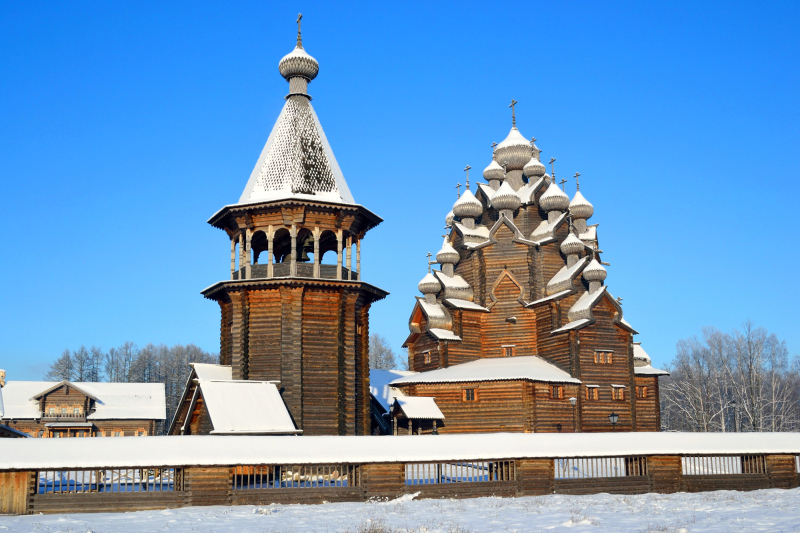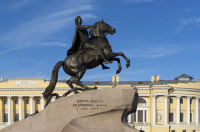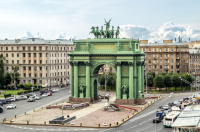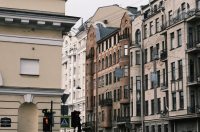- How to get there: by bus from Lomonosovskaya/Dybenko metro stations
- Entrance fee: free
If you think you already know what wooden architecture in St. Petersburg is all about, the Bogoslovka Mansion will offer a fresh perspective. This culturally themed park introduces you to the spirit of the Russian North through restored copies of wooden structures that date back centuries.
The park's centerpiece is the Church of the Intercession, adorned with 25 onion-shaped domes. This is a replica of the church built in the Vologda Oblast during the 18th century. The original was lost in a fire, but the blueprints were kept safe and, in 2008, it arose again in a new place. Alongside the church are also a bell tower, a chapel, and a refectory. For a deeper immersion, you can join the park’s weekend guided tour or visit its museum of peasant households.
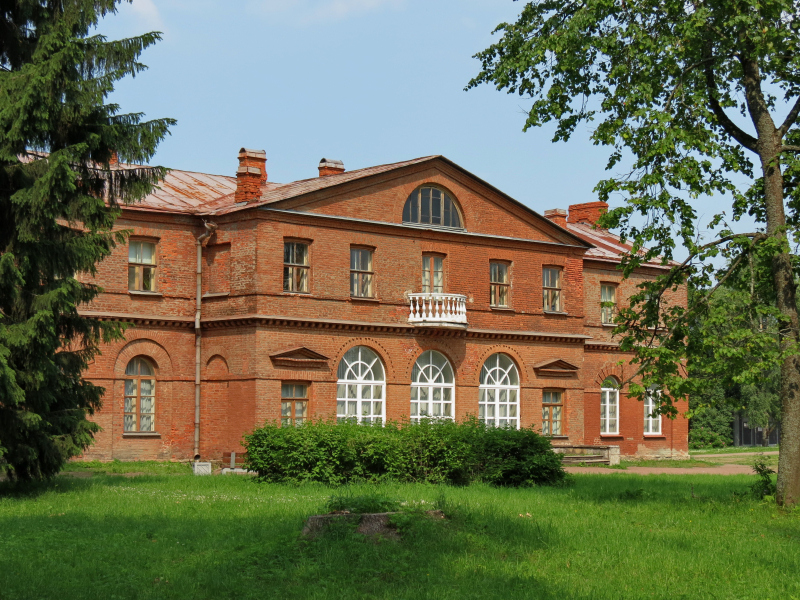
Priyutino mansion. Credit: Reo1969, CC BY-SA 4.0, via Wikimedia Commons
- How to get there: by suburban train to the Berngardovka station
- Entrance fee: 150 rubles
The 19th-century mansion used to belong to Alexey Olenin, the head of the St. Petersburg Academy of Arts and Imperial Public Library. A friend of many artists, poets, and writers, he often held gatherings where Pushkin, Glinka, and Krylov were guests. Nowadays, the building houses a museum of literature and art. The rooms preserve the atmosphere of noble life. While the interiors have been restored, there are also many original items on display, including the personal belongings of the Olenin family.
Similarly, from the outside, it’s a notable piece of architecture. And it is precisely its modesty that makes it special – at the time, a red brick mansion without ornamentation was rare if not built for industrial purposes. Add a quaint park around it and you get a lovely location for a winter adventure.
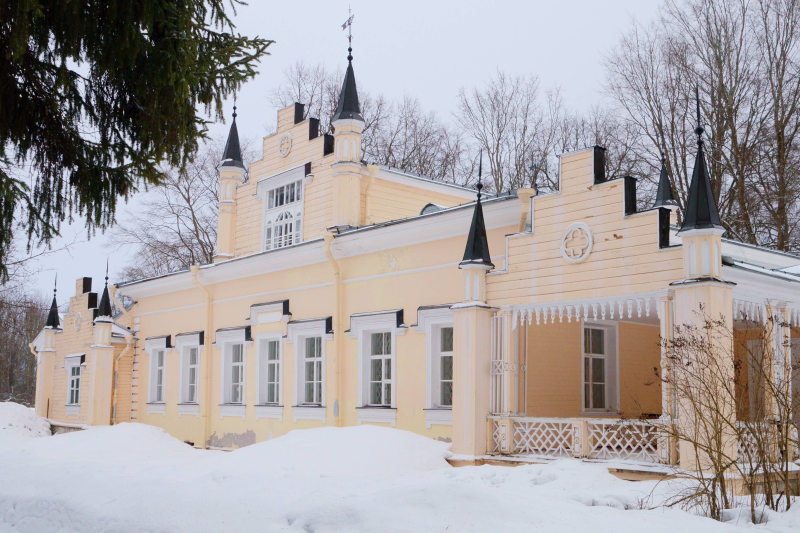
Nicholas Roerich mansion. Credit: Gudkova Natalia, CC BY-SA 4.0,via Wikimedia Commons
- How to get there: by bus from the Baltiyskaya metro station
- Entrance fee: Free
A park with centuries-old trees, pristine springs, and tranquil lakes – this is what a winter wonderland looks like. And among the breathtaking scenery of the village Izvara stands the two-towered mansion, which for 28 years was home to the Roerichs, a family of well-known Russian artists. It was here that Nicholas Roerich spent his childhood and began his acquaintance with eastern cultures.
As you might expect, the mansion has been transformed into a museum of his life and work. Among its fascinating exhibits are personal correspondence, the artist's belongings, and a few paintings. The museum is the heart of the cultural life of the neighborhood, regularly organizing film screenings, poetry evenings, and educational events.
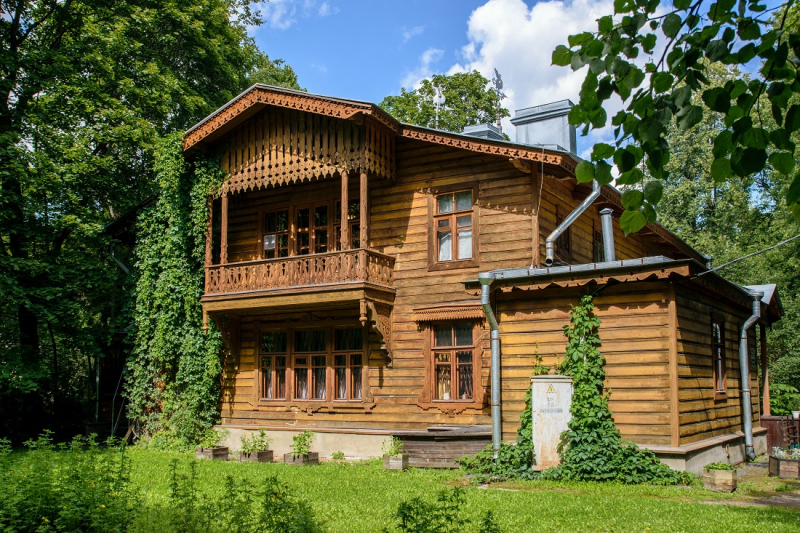
Pavel Chistyakov house mueum. Credit: Elena Koroteeva, CC BY-SA 4.0, via Wikimedia Commons
- How to get there: by suburban train to the Tsarskoye Selo station
- Entrance fee: 200 rubles
You may not be familiar with the name of the artist Pavel Chistyakov, but, as a teacher, he has influenced many prominent figures in Russian art, including Vasnetsov, Vrubel, and Polenov. His mid-19th century wooden dacha in Pushkin has been transformed into a memorial museum now carefully preserved by the Academy of Arts. This is a relatively small house compared to the other grand mansions on the list, but definitely one of the coziest. Chistyakov was actively involved in developing the design, creating drawings for the carved elements throughout the house. At the museum, you can learn more about his life, explore his personal belongings, and admire his artwork.
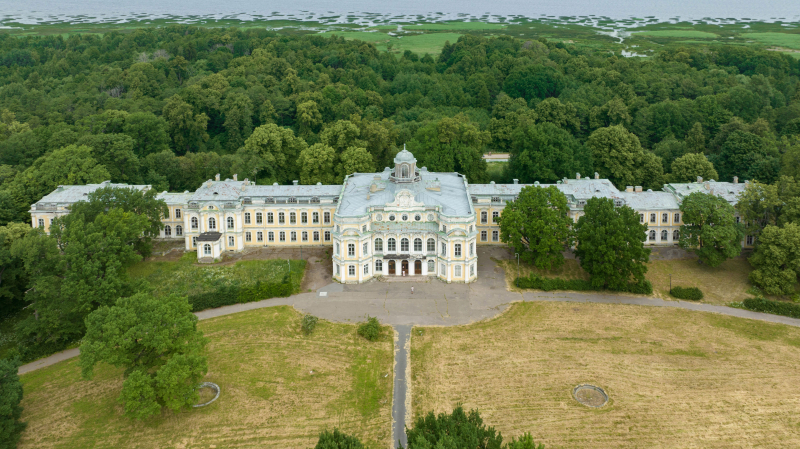
Znamenka mansion. Credit: Nikolai Bulykin, CC BY-SA 4.0, via Wikimedia Commons
- How to get there: by suburban train to the Noviy Peterhof station
- Entrance fee: entrance restricted
Despite being abandoned, this mansion on the shore of the Gulf of Finland is loved by both locals and visitors of Peterhof. Its pompous facade is a result of several iterations: originally built as a classical palace for the emperor Nicholas I, in the 1850s it was reconstructed in the neo-baroque style for his third son. The entrance is currently restricted, but no one can stop you from feasting your eyes on this UNESCO World Heritage Site from the outside and strolling through the expansive park that surrounds the premises.
